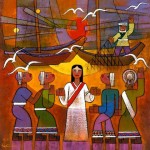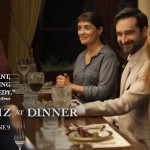 A Story of the One Who Hears and Understands
A Story of the One Who Hears and Understands
The Washington Post carried a story today, by Stephanie McCrummen, about a Moslem doctor and his family who have been living in Dawson Minnesota for five years now.
Ayaz Virji, 42 years old, and his wife Musarrat had been charmed by the welcome the town gave them three years before, when they were looking for a place to raise their three children, a place where Ayaz could practice what he calls dignified medicine. They were the first Moslems ever to live in Dawson.
And Dawson did welcome them, in so many ways. They made friends. The local Lutheran butcher offered to prepare meat according to halal law, so that the Virjis wouldn’t have to drive as hundred miles to buy their food.
But that was before the 2016 election, when candidate Trump whipped up crowds by saying maybe he’d have to close down mosques and maybe Moslems were people who could never be fully American.
Dawson was a town Obama had won twice. When Trump came in first in Dawson votes, the Virjis lives changed. Ayaz, a Muslim of Indian descent, born in Kenya, raised in Florida, educated at Georgetown, began to look at job opportunities in Dubai. His brother, who received a hate fax the day after the election, was moving to Canada.
Then a patient, the Lutheran student minister, Mandy France, asked Ayaz if he would give a talk about Islam to the Dawson community, to dispel some of the fearful things people were saying about Moslems. Ayaz was hesitant, but decided to give it a try. Four hundred people turned out at the high school to hear him. Mandy France told him they were scared ,and their questions reflected that. He did his best to answer them, and all seemed well.
Well enough, that he accepted another invitation from a nearby smaller town, Montevideo. Seventy-five people were waiting for him at the Library, including some men with Bibles, who began shouting as he began talking, calling him the anti-Christ, and praying for his salvation. His wife, and 9 year old daughter were scared enough to move toward the exit.
In the days after, people wrote letters to the paper saying they were embarrassed this had happened, but Ayaz decided he was done trying to explain Islam. Except, the invitations kept coming.
One came from Granite Falls, an even smaller town, a half hour away. And people, nurses, doctors, the student minister, advised Ayaz not to go. It was rougher there, they said. But Ayaz said he had accepted, and was going, though very nervous.
Pastor Mandy was going with him. She told him she would open with a Bible reading. And she warned him someone would likely throw John 14:1 at him, “I am the way, the truth, the light,” which some Christians take to mean Jesus is the only path to salvation. Ayaz found a Bible verse in which Jesus is unsparingly harsh to hypocrites.
A neighbor brought him a bullet proof vest, and he tried it on but thought it too bulky and conspicuous, and took it off. “We really appreciate you doing these talks and stuff,” said the neighbor, as he took the vest away. “Yes, sure,” said Ayaz.
So off they went. And Mandy started the meeting. And then Ayaz stood up. (And here I quote Stephanie McCrummen’s excellent article:)
He said he hoped what he had to say might lead to a better understanding of one another, which was the point of the talk. “So, with that, I begin in the name of God, the most beneficent and most merciful,” he said, reciting the Islamic phrase that usually comes before prayer.
Some people shifted in their chairs.
He introduced himself as a doctor who had studied comparative religion at Georgetown with professors who were “the epitome of intellect and scholarship.” He said that what he learned was that if you want to understand Islam, or anything, “you have to be sincere” and “you have to use your brain.”
“Because it’s easy to demonize. You know, ‘Everybody else is crazy and I’m just right,’ ” he said sharply. “And what kind of society does that create? That’s what ISIS does. That’s what these zealots do. Do we want to be like that? As Americans, don’t we want to be better than that? Webetter be better than that.”
He glanced at his outline and made the point that of course Islam has its zealots, and he condemns them.
“But that’s not what we’re talking about,” he said. “Because if you say, ‘That’s Islam,’ then that’s like me saying, ‘Well, Christianity is David Koresh,’ ” he said, referring to the cult leader.
He began pacing a bit. People were listening.
“Do you guys know who the LRA is?” he said, referring to the Lord’s Resistance Army, the cultish Ugandan rebel group blamed for the deaths of more than 100,000 people. “How many of you knew about that? I want you to raise your hands.”
Two hands went up.
“How come you don’t know about that?” Ayaz said. “How come only Islam has terrorism? The KKK had 5 million members in the 1920s. Lynching of black people was normal. It was routine. Why don’t we look at ourselves, too, as well as others? You have alternative facts? Then go to a different lecture.”
No one was getting up to leave.
“So, the purpose of today is to know one another,” Ayaz continued, going back to the outline.He quoted Koran verses to explain how there is no compulsion to convert people to Islam, how extremists who believe that “hate me more than they hate you,” and how Islam means peace, and soon, he began to veer.
“So Islam is not what you see on TV, okay?” he said. “I know Fox News. It’s not news. It’s the WWF, okay? Don’t use them as my spokesperson. When you say, ‘These people are animals and we have to blow them up,’ don’t say, ‘This is Islam.’ It’s not. And 99.9 percent of us will agree we need to condemn these people and it hurts us even more because they’re saying that God said this? Muhammad said this? Never in a million years.”
He began talking about Trump’s former national security adviser, Michael Flynn, who had referred to Islam as a “vicious cancer.”
“There are 1.6 billion Muslims in the world! Now, according to General Flynn, we have to purge them? ‘We have to purge the world of Islam!’ ” he said in a mocking voice.
“You can sense I’m angry about that,” he said. “Wasn’t Jesus angry when he went into the temple and knocked over the tables of the money changers? He was angry. Injustice should make us angry! Okay? I am angry about the election. Because there is injustice there, and I have felt that within my family. And with the burning of mosques? And something like 150 bomb threats to Jewish synagogues? We should think.”
People were just sitting there, listening, not saying anything.
He asked them to imagine how they would feel if he judged Christians the way some people judge Muslims. If he was dishonest, he said, he would pull out all the most violent Bible verses and say Christianity commands followers to kill.If he was unfair, he would call the Christian cross a “symbol of torture.”
The room was quiet.
He moved on to what the Koran says about women, that they should be treated with dignity, and what Trump had said about grabbing women.“What did he say? What did he say? You know what he said.”
He went over the history of Islam in America. He mentioned that Thomas Jefferson hosted what is considered an iftar dinner, the meal that breaks the fast during the holy month of Ramadan. He talked about refugees. He talked about mercy. He talked and kept talking, and after an hour and a half in which not one person had left the room, Pastor Mandy tapped him on the arm and whispered that he needed to finish.“I gotta do this,” he told her.
He had one last thing to say, about judgment. He read the Bible verse he had written down the night before from the Gospel of Matthew, which describes what Jesus will say to those who professed his name but failed him.“And he will say, ‘I never knew you,’ ” Ayaz read. “ ‘Get away from me, you wicked people.’ ”
And Ayaz sat down. And Pastor Mandy asked if there were questions.
A woman stood up and thanked Ayaz, saying they needed this. A man with a beard said, “I don’t have a specific question for you, but maybe a comment,” he said. “In the U.S., the way we teach American history, we condense it down so much. We clean it up. We leave out a whole bunch of things. As Christians, we sanitize it even more . . . and you kind of alluded to that. People really need to be honest about our history.”
“I would agree with you, well said,” Ayaz said. “Who’s next?”
He scanned the hands, and called on a man with short gray hair, who stood up.
“Um, I guess where I’d want to go is simply — ” he began, then started over again. “Part of what I want to share with you is this.” He paused for a moment. “I hear a lot of pain from you this evening.”
Ayaz was looking at him. He was listening.“Um, I’m sorry,” the man said.
“Thank you for that,’ Ayaz said. And then he listened to the applause.
Arriving back in Dawson, he still felt different, more and more like a stranger in a rural Midwestern town. He didn’t want to feel that way. He hoped in time he wouldn’t. He turned onto Pine Street, and then he was home.
This week we read Matthew’s version of Jesus’ parable of the sower, some of whose seed is eaten by birds, and some falls onto rocks and onto thorns, and dies. But some falls onto good soil. And Matthew says that soil is the ones who hear and understand what they hear, and the seed, in them, bears fruit, and yields a harvest of goodness.
And so here we are. In Minnesota, in New Hampshire, wherever we are, the question is, are we as fruitful as the people of Granite Falls, who were said to be rocky ground, became on that night?
Because Ayaz Virji was indeed the one who heard and understood, and bore fruit and yielded many times over the good seed that had fallen upon him.
And who, then, are we, now?
_______________________________________________________________________________________________
Image: Dr. Ayaz Virji, You Tube.com, from a medical video.










